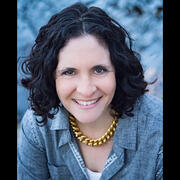
The following essay was written by Holly Lebowitz Rossi, MTS ’99.
Most of us can affirm the existence of a profound connection between body and mind.
Through any religious or spiritual lens—or just a nameless intuition—we experience our lives at the most basic level by juxtaposing how we move through the outside world with how we feel at our innermost center.
During the coronavirus crisis, staying healthy, grounded, and calm is a particular challenge. None of us is doing much “moving through the outside world” at the moment, and we are facing anxiety, grief, stress, and sadness on top of needing to reorganize almost everything about our daily routines.
This time of isolation carries with it the danger of loneliness and disconnection. Even with all the opportunities for virtual conversation we have, there’s still the risk that we might feel cut off from ourselves, technically connected with people we care about, but distant from the feeling that we’re fully inhabiting our own lives.
In a word, we might begin to feel disembodied.
I write about evidence-based positive psychology and holistic health practices for a living, and I’m here to encourage anyone reading this to trust that there are many ways to cultivate embodiment, to focus on that center of the Venn diagram between mind and body, spirit and matter, feelings and actions.
Researchers who study techniques for managing anxiety and processing traumatic experiences actually use the term “embodied practices” to describe some of the most effective ways of coping.
At some level most of us know what we have to do—we need to breathe fully and deeply, we need to sleep regularly and restoratively, we need to nourish ourselves with pleasing, healthy foods and plenty of water, and we need to move our bodies.
But we also need to have the courage to let ourselves be led in the healthy direction, which is where setting an intention to engage in an embodied practice is so helpful.
Yoga is a classic example of an embodied practice precisely because it focuses on what’s in your mind and takes your body through a set of movements that encourage your brain to calm down, wake up, or find balance between rest and activity. The new book I coauthored, The Yoga Effect: A Proven Program for Depression and Anxiety, explores recent research that connects yoga practice with improved mood and decreased anxiety.
There are other embodied, movement-based spiritual practices, like tai chi or qi gong. But embodiment can come whenever we practice a meaningful activity with mindful attention, from gardening to cooking to walking. Especially in a time when we are asked to be flexible with how we meet our needs, be reassured that you can connect with a practice that is healing to both your mind and body.
Whatever practice you are drawn to during this unsettling time, try to keep these three ideas in mind.
Meet yourself wherever you are. If you are lethargic and overwhelmed—or frenetic and jittery—radically accept that this is where you are right now. Then ask yourself what would be helpful to take even one step in a more grounded or peaceful direction.
Acknowledge the full range of your emotions. Being “mindful” does not mean being “happy.” You are not doing something wrong just because you feel so-called “negative” emotions like sadness or fear. Recognize that a healthy emotional life is full and round—and that all feelings are parts of the whole that is yourself.
A little goes a long way. You do not need to spend hours a day practicing self-care in order to benefit emotionally and physically. Even a few moments of deep breathing or mindful movement can serve as that reminder to bring your body and mind into their natural, powerful state of connection.
Holly Lebowitz Rossi, MTS ’99, is coauthor of The Yoga Effect: A Proven Program for Depression and Anxiety. She lives in Arlington, Massachusetts.
